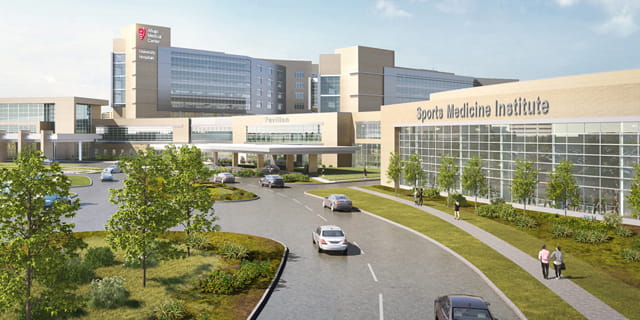Moving Forward with UH Ahuja Medical Center Expansion

New buildings will feature labor and delivery, NICU, sports rehab, women’s health and comprehensive breast health center, and other services; 1,000 new jobs to be added
University Hospitals has announced development plans for its UH Ahuja Medical Center that will respond to needs of the community through the expansion of services. The health system, which provides services to 1.3 million patients each year, plans to break ground on a $200 million Phase 2 building project in Fall 2019.
UH Ahuja Medical Center was originally envisioned as having a multi-stage evolution in providing services for the community. Phase 1, opened in 2011, produced the current 144-bed hospital, 22-bed emergency department, and 60,000-square-foot outpatient medical building visible from I-271 near Harvard Road. Phase 2 will add a second, five-floor hospital tower and a two-floor sports medicine complex at 64,000 sq. ft. to the southwest side of the existing buildings.
“As a result of significant increased patient demand for our services and our plan for the future health care needs of the community, we are extremely pleased to announce this further development of UH Ahuja Medical Center,” said Thomas F. Zenty III, CEO of UH.
UH Ahuja Medical Center Phase 2 will feature:
- New labor and delivery and other mother and baby services.
- New neonatal intensive care unit (Level 2), increasing capacity to provide UH Rainbow NICU care and extending services to the east side.
- New, expanded emergency room growing from 22 beds to 30 beds.
- Women's health and comprehensive breast health center, adding to services currently at the nearby UH Minoff Health Center at Chagrin Highlands.
- Expanded radiology to meet demands of emergency room, Harrington Heart and Vascular Institute and sports medicine.
- The largest sports medicine complex in Northeast Ohio, with a performance center, outpatient rehabilitation space, 18 exam rooms and two diagnostic radiology units, with convenient access to MRI capabilities and adjacent to operating rooms.
- New ambulatory surgical center with eight new operating rooms and 32 universal pre- and post-op beds. • Expanded ambulatory services. UH Harrington Heart & Vascular Institute will add 10 new exam rooms. Currently Harrington clinic rooms are running near capacity.
- Expanded observation unit (all private beds), serving a growing number of patients who can be treated and released the same day.
- New short stay unit (less than 24 hours) dedicated to patients who need less than 24 hours of care in the ambulatory surgical center.
According to Daniel I. Simon, MD, President, University Hospitals Medical Centers, “UH Ahuja Phase 2 addresses patient needs in Northeast Ohio for advanced, high-quality health care.
“Based on the patients we are seeing across the system, there is an incredible need for expanded NICU services, which the Ahuja Phase 2 project will address. Our 87-bed UH Rainbow NICU on UH’s main campus is often filled near to capacity,” said Dr. Simon.
Construction of Ahuja Phase 2 follows the 2018 opening of the UH Rainbow Center for Women & Children. The $40 million UH Rainbow Center provides a continuum of mother-child care close to home for residents of Cleveland’s Midtown community. Dr. Simon points to recent improvements in infant mortality in Cleveland as evidence that improving access to health care improves outcomes.
“We believe that our efforts to expand access to services, in Cleveland’s Midtown and at UH Ahuja, will help our patients be well, get well and manage their complex health conditions,” said Dr. Simon.
Ahuja Phase 2 will be funded through bond financing and the generosity of donors. When complete, Phase 2 will add approximately 1,000 new jobs (full- and part-time) to the medical center campus.
Architects for the project will be HKS, Inc., a global, award-winning firm which designed the current buildings on the site. The project will take about three years to complete.
At the time of its construction, Phase 1 of the UH Ahuja complex was the first new stand-alone hospital built in Northeast Ohio in more than a quarter-century. It was designed with input from physicians, nurses, patients, employees and community leaders to ensure a patient, family, and staff-friendly healing environment for the delivery of personalized, efficient patient services.
According to Mr. Zenty, UH Ahuja Phase 2 will feature many of the same characteristics as the original hospital, which has bright, airy spaces, healthy food choices, healing gardens, and community wellness and health education spaces.
“When we built UH Ahuja Medical Center, we ushered in a whole new design to the hospital for patient care and wellness. We looked at the access to natural light and open design of the building as being a beneficial part of the healing process,” said Mr. Zenty. “In the second phase, we will incorporate those same design features.”
With an environmentally-sustainable design, the medical center will feature eco-friendly materials and processes to minimize energy costs and reduce the impact on the environment. For example, the parking lots surrounding the UH Ahuja Medical Center feature a green technology called bioswales, which are landscape elements designed to collect, filter, and redistribute surface runoff water.
UH Ahuja Medical Center is named in honor of former UH Board Chair Monte Ahuja, his wife, Usha, and their family, who donated $30 million to UH in support of the Vision 2010 campaign.
The original construction of UH Ahuja Medical Center, which was a $244 million project, was a key component of UH’s $1.2 billion Vision 2010 strategic plan that also included UH Seidman Cancer Center, UH Cleveland Medical Center’s Center for Emergency Medicine, and a new Neonatal Intensive Care Unit at UH Rainbow Babies & Children’s Hospital.
Monte Ahuja said, “My family and I are pleased with the role UH Ahuja has played in providing high quality health care to thousands of families since its opening in 2011. We look forward to the next phase of development and its continued role to the community. We remain committed to our continued support and dedication to this great institution.”


